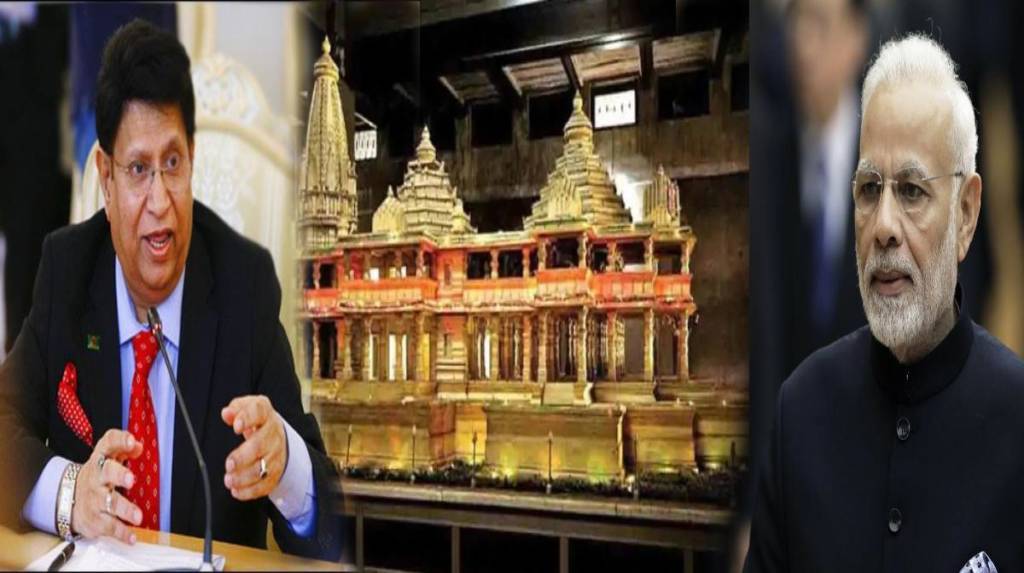At a time when crores of Bhagwan Ram devotees around the world eagerly await the bhoomi pujan (foundation ceremony) of the Ram Mandir construction, Bangladesh has suddenly tried to spoil the enthusiasm with some rather offensive remarks. Babri Masjid and Ram temple have always been an emotive issue in Bangladesh’s Islamist circles and Dhaka is raking it up all over again.
Bangladesh’s Foreign Minister, AK Abdul Momen has advised that New Delhi should avoid taking steps that can spoil historic Indo-Bangladesh ties. More than offensive and intrusive, Momen’s comments are frightening since Bangladesh has a very strong tendency to abuse and torment its marginalised Hindu minority over the sensitive Ayodhya Ram janmabhoomi issue.
According to The Hindu, Bangladesh’s Foreign Minister said, “India and Bangladesh share a historic and arterial relationship. We will not allow this [temple construction] to hurt ties but I would still urge that India should not allow any development that can fracture our beautiful and deep relationship. This is valid for both our countries and I would say both sides should work in such a way so that such disruptions can be averted.”
At the outset, it doesn’t really make any sense for Momen to make such preposterous remarks. The Ram Mandir is being built legitimately by India on its own land and that too after a long-drawn legal process. Momen or his government doesn’t have to make an effort to restore ‘historic ties’ between the two countries, as India has made no real provocation.
Why should Bangladesh even be concerned? Wasn’t the country formed on the basis of Bengali chauvinism? Now, why is the Sheikh Hasina government concerned about a temple in Ayodhya that doesn’t affect Bangladesh in any way?
By weaponizing the Ram mandir construction in its foreign policy, Bangladesh has really put its 17 million Hindus at the peril of radical jihadists who continue to dominate the country.
By implying that Ram mandir construction should be a matter of concern for Dhaka, Momen could be instigating the radical Islamists within his country.
Whatever happens in Ayodhya usually witnesses brutal reactions in Bangladesh. Exactly decades ago, in the month of October 1990, there were rumours in Bangladesh that the Babri Masjid was demolished. This was followed by a series of well-orchestrated attacks on Hindus from October 30 to November 2. According to the Associated Press, witnesses said that mobs attacked temples, desecrated idols and burnt hundreds of homes.
Two years later, the Babri Masjid was demolished and thus the Islamists in Bangladesh responded with sheer brutality. This round of assaults against Hindus lasted much longer than the 1990 attacks.
Reporting about the events of December 1992 anti-Hindu pogrom in Bangladesh, UNHRC’s Refworld reported, “About 5,000 young men with rods and bamboo sticks tried to storm Dhaka National Stadium, but they were beaten back by police firing tear gas and rubber bullets. At least 10 people have died, many Hindu women have been raped, and hundreds of Hindu homes and temples have been destroyed.”
A primary report of the Human Rights Congress for Bangladesh Minorities (HRCBM) states, “During 1992, Jamat-I-Islami, a coalition partner of then ruling party BNP was directly involved in the atrocities against minorities, rather some termed this as the spontaneous protest for the demolition of “Babri Mosque” in India. In 1992, more than a thousand women being gang raped, hundreds of temple(s) demolished, houses of Hindu minorities were set ablaze and earthly possessions of minorities were looted.”
In fact, Taslima Nasrin’s Lajja (Shame) itself was based upon the atrocities and mob violence committed against Bangladeshi Hindus following reports of Babri Masjid demolition. Bangladeshi Islamists continue to target her with death threats ever since.
So, what does the Bangladesh Foreign Minister plan to achieve by fanning communal passions on the issue of Ram Mandir construction? If anything, the Bangladesh government should try to protect its marginalised Hindu community which faces the threat of becoming extinct over the next three decades.
Bangladesh has failed the “secular” and “Bengali” tenets on the basis of which it was liberated from Pakistan by Sheikh Mujibur Rahman. In 1977- six years after its formation, Bangladesh was taken over by Ziaur Rahman who replaced Constitutional secularism with “absolute trust and faith in almighty Allah.”
Even Ziaur Rahman’s widow Khaleeda Zia, who is Prime Minister Sheikh Hasina’s main rival, cultivated and accommodated Islamist radicals when she was the Prime Minister of Bangladesh.
Pakistan’s ISI has been further spreading its tentacles into Bangladesh. It wants to exploit the deep fault-lines in the nominal Bangladeshi secularism. Sheikh Hasina, the daughter of Sheikh Mujibur Rahman, is supposed to keep Islamists at bay. However, a study suggests that 91 per cent of the Islamist terror attacks in Bangladesh between 2005 to 2017 have taken place with Hasina at the helm of affairs.
Bangladesh isn’t able to get rid of the Islamist stronghold even if it wants to. Sheikh Hasina and her Foreign Minister must prioritise and stop taking digs at India over issues that are completely internal to New Delhi.
